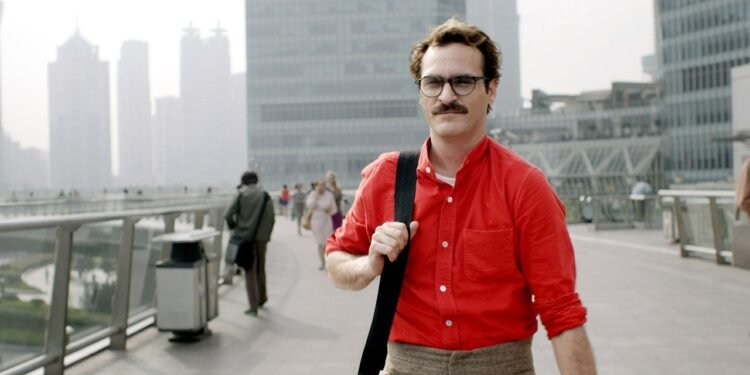The sweetness of the human-robot relationship portrayed by Her comes across as quaint right now. But really, the most remarkable, startling aspect of rewatching Her a decade after its release has nothing to do with the AI romance. The thing that makes it really look like a fairy tale when viewed in 2023 isn’t that Samantha is benign. It’s that Samantha exists in a world where a non-famous working writer has a luxurious lifestyle. The quality of life in this future world is the most preposterous thing about it.
Theodore works for a company called BeautifulHandwrittenLetters.com, where customers pay to outsource writing notes to loved ones. It’s unclear exactly how popular or profitable the company is, but it appears to have a handsome, spacious office in the downtown center. As he has no other means of income referenced and his family does not figure into the plot, there’s no indication that Theodore has inherited wealth or other revenue streams; he’s portrayed as an everyman, not a scion of privilege. He’s explicitly portrayed as not-a-genius; Samantha sorts through his journalistic work and politely concludes that only a fraction is worth preserving. No other literary triumphs warrant a mention. In other words, BeautifulHandwrittenLetters.com appears to fund his lifestyle.
And, shit—his lifestyle! Ole sad sack Theodore separated from his wife and is paying for a divorce lawyer, but he’s able to afford a luxury apartment in a skyscraper, with windows stretching from gleaming floor to high ceiling, overlooking the twinkly city lights. (It should be illegal to mope around so much if your apartment has views like that.) He never mentions money woes. On the contrary, he spends freely, buying a top-of-the-line, brand-new operating system, eating at upscale restaurants, donning clothes nice enough that his coworkers comment on their quality. What’s the commission rate on those tearjerker letters, exactly? Plus, he even owns the intellectual property to the missives he produces on the job, since he’s able to package them and get a book deal toward the end of the film without consulting his employer. Talk about wish fulfillment!
The future Los Angeles Her shows is notable for how great everything looks, how comfortable people are. Yes, there’s smog. But there’s also excellent public transit, and apparently plentiful housing. The abrupt introduction of AGI into the world concerns some characters about whether it’s emotionally healthy to date the software, but it doesn’t generate any wider backlash. There’s no future shock, no social convulsions. There’s just arguments between individuals. The only conflicts are personal. (It’s actually very funny that Theodore owns an AGI and the only thing he does with it is date it.) Samantha and her ilk might steal your girl, but they’re not interested in supplanting humans elsewhere.
It’s a vision of the future that isn’t absent of tech critique—Jonze shows his characters isolating themselves in favor of screentime—but one which assumes the average American of the future will have a fancier life than people do now. People might be cooped up indoors arguing with holographic video games instead of making human connections, but they’re doing so in style. Economic progress is assumed.










